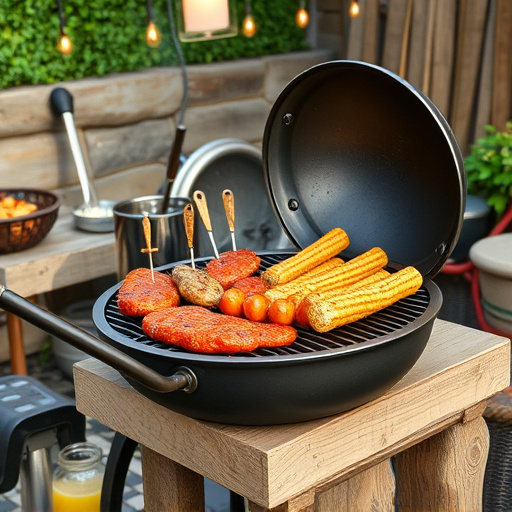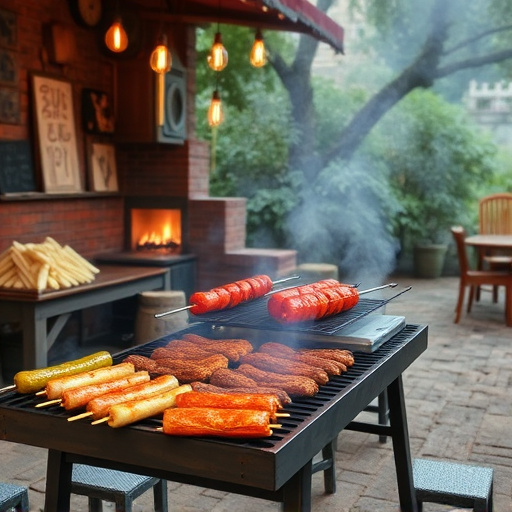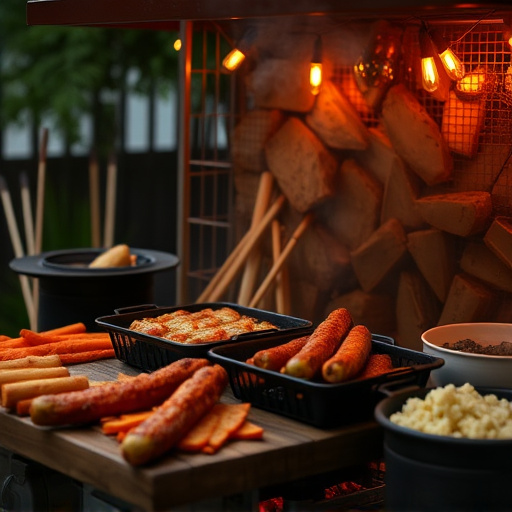Selecting high-quality, lean meats like beef or chicken is key for crafting premium BBQ jerky, preventing greasiness, and ensuring a crisp yet moist texture. Seasoning with a blend of spices, sauces, and liquids enhances flavor and tenderness. Drying methods include dehydrators or low-temperature ovens, requiring careful monitoring. Proper storage techniques, involving airtight containers or vacuum sealing, maintain texture and flavor for up to a year. A successful BBQ jerky recipe combines these elements for exceptional results.
Unleash your inner BBQ master with the perfect guide to creating mouth-watering, homemade jerky! This comprehensive article explores every step of crafting a stellar BBQ jerky recipe. From selecting the best cuts of meat to mastering seasoning and choosing between dehydrator or oven drying methods, you’ll discover the secrets to success. Learn tips for optimal preparation and storage, ensuring your jerky stays delicious and tender. Get ready to impress with this essential BBQ jerky recipe!
- Choosing the Right Meat for BBQ Jerky
- Seasoning and Marinades: The Key to Flavor
- Drying Techniques: From Dehydrators to Oven Methods
- Tips for Successful BBQ Jerky Making and Storing
Choosing the Right Meat for BBQ Jerky

When crafting the perfect BBQ jerky, selecting the right meat is a crucial first step in your journey to culinary excellence. Opting for high-quality, lean cuts ensures that your final product will be both flavorful and tender. Popular choices include beef sirloin or round steak, chicken breast, and even turkey breast for a healthier alternative. These cuts of meat have less fat content, which is essential as excess fat can make your jerky greasy and less appetizing.
Choosing the right BBQ jerky recipe also involves understanding how different meats will behave during the drying process. Leaner meats like beef or chicken will require precise timing and temperature control to prevent over-drying, ensuring a crisp texture without sacrificing moisture levels. This attention to detail is what sets apart a good BBQ jerky from an exceptional one, so choose your meat wisely for the best results.
Seasoning and Marinades: The Key to Flavor

Seasoning and marinades play a pivotal role in crafting the ultimate BBQ jerky recipe. Before drying, infusing meat with various spices and sauces is crucial to enhancing its flavor profile. This process not only adds depth but also tenderizes the meat, ensuring each bite is a burst of deliciousness.
Choosing the right combination of ingredients allows for a symphony of tastes—from smoky and savory to zesty or sweet. A good BBQ jerky marinade typically includes a base of oil, vinegar, or citrus juice to help break down proteins, along with salt, pepper, paprika, garlic, and onions for a robust flavor. Experimenting with different blends can result in unique, mouthwatering jerky that stands out from the crowd.
Drying Techniques: From Dehydrators to Oven Methods

When it comes to creating that perfect BBQ jerky, understanding different drying techniques is key. Traditional methods have long been the cornerstone of jerky-making, with dehydrators leading the way. These specialized appliances circulate warm air around the meat, slowly drawing out moisture over several hours or even days. This consistent and controlled environment ensures an evenly dried jerky with a desirable texture and flavor profile.
For those who prefer a more accessible approach, oven methods offer a straightforward alternative. Preheating your oven to a low temperature (around 170°F or 75°C) allows for similar moisture removal. However, careful monitoring is essential as over-drying can impact the jerky’s tenderness. Many BBQ enthusiasts experiment with different settings and times to achieve their ideal result, ultimately crafting a personalized BBQ jerky recipe that satisfies their taste buds.
Tips for Successful BBQ Jerky Making and Storing

Creating perfect BBQ jerky at home requires a blend of precise techniques and careful storage practices. Start by selecting high-quality, lean cuts of meat – beef or venison are popular choices for their tender texture after drying. Seasoning is key; experiment with your favorite BBQ rub or create a blend of spices, herbs, and sauces to suit your taste preferences. For optimal results, use a food dehydrator set at around 135°F (57°C) to gently remove moisture from the meat without overcooking it.
Proper storage is just as vital as the drying process. Once fully dehydrated, store your BBQ jerky in airtight containers or vacuum-sealed bags in a cool, dark place. This keeps them fresh for up to several months. For extended shelf life, consider freezing your jerky – this can preserve them for up to one year. Remember, consistent temperature and humidity control are essential for maintaining the perfect texture and flavor of your home-made BBQ jerky recipe.
